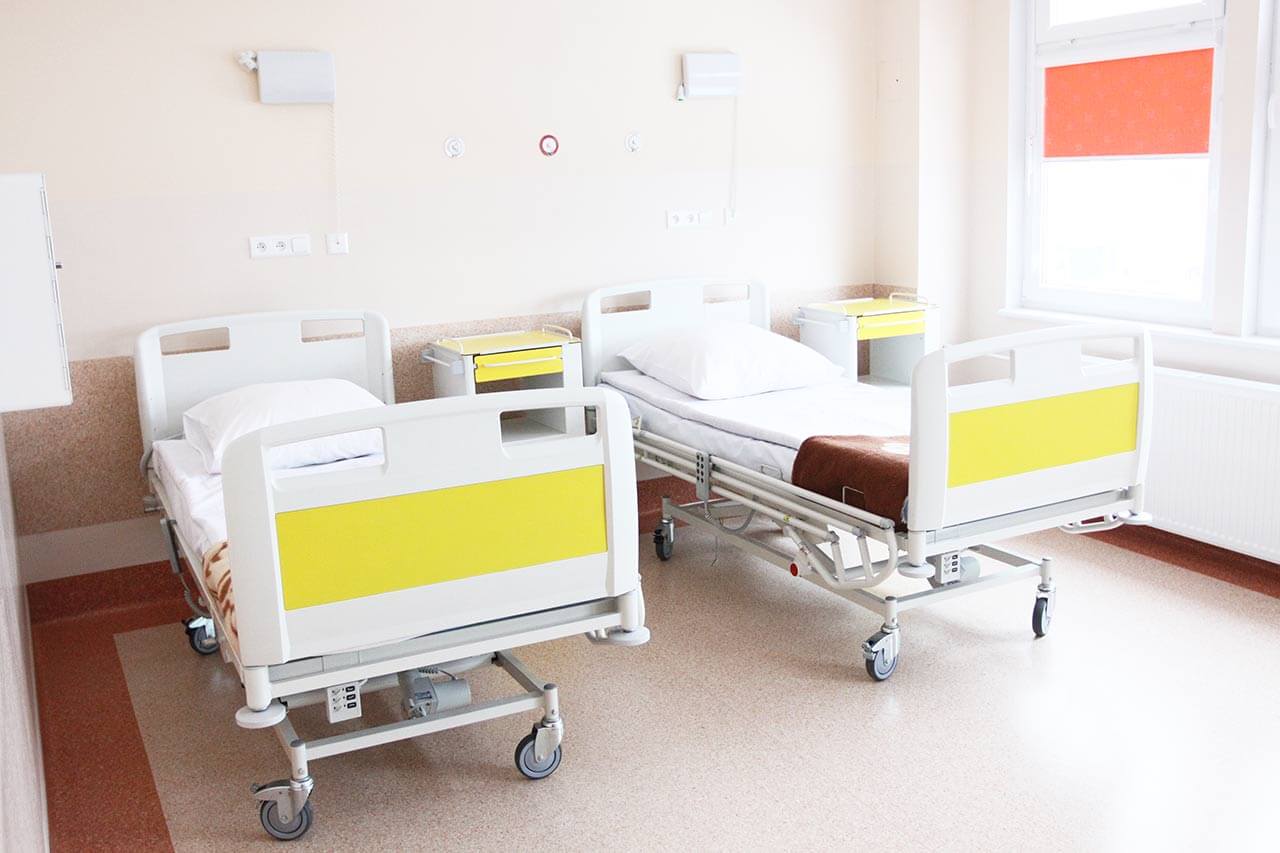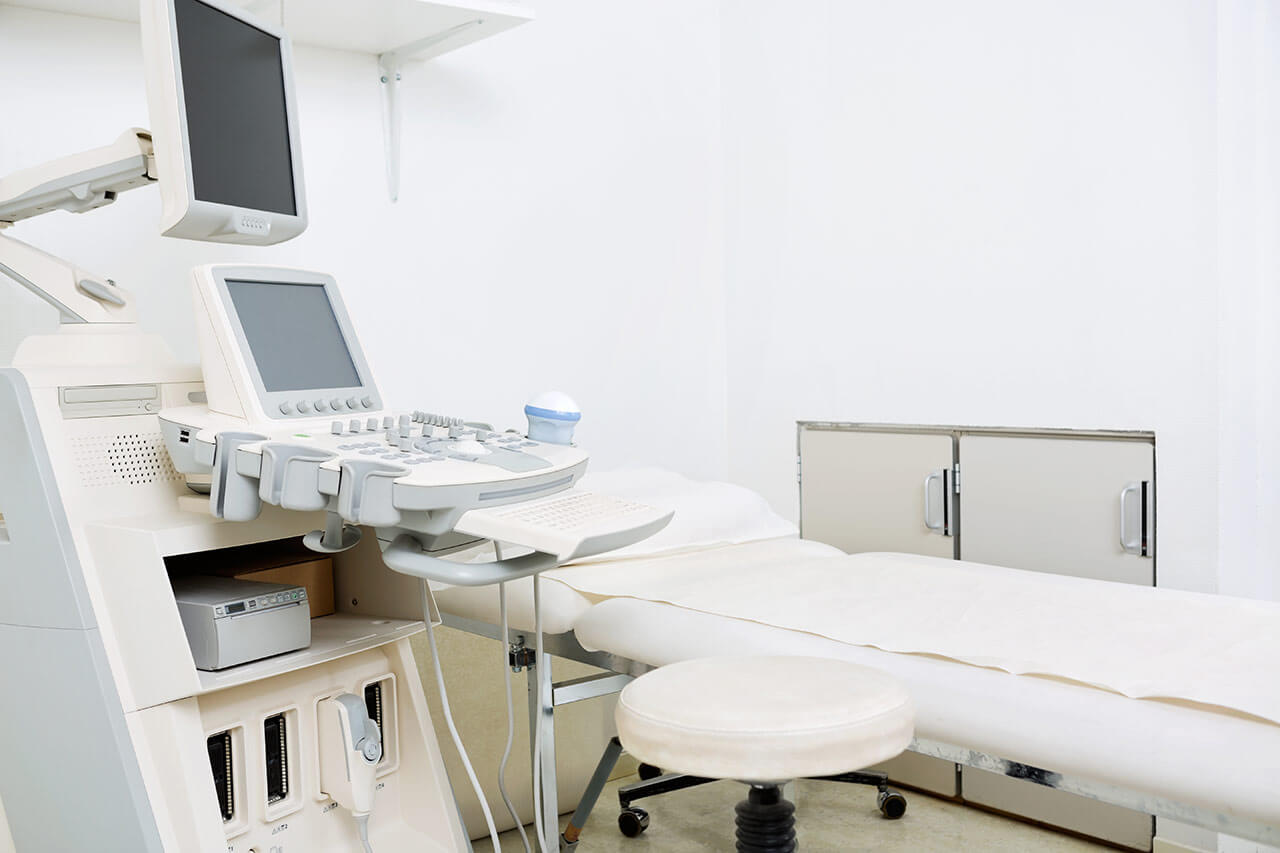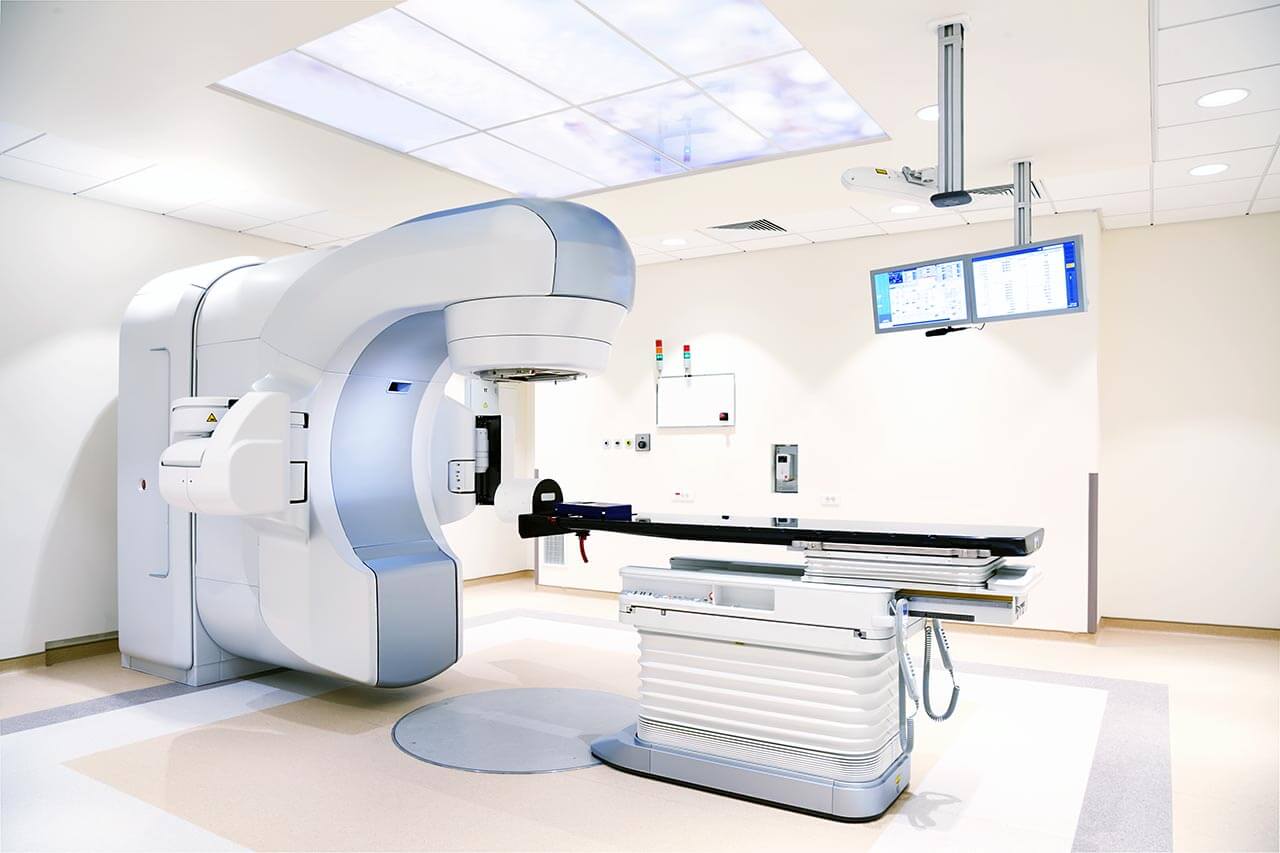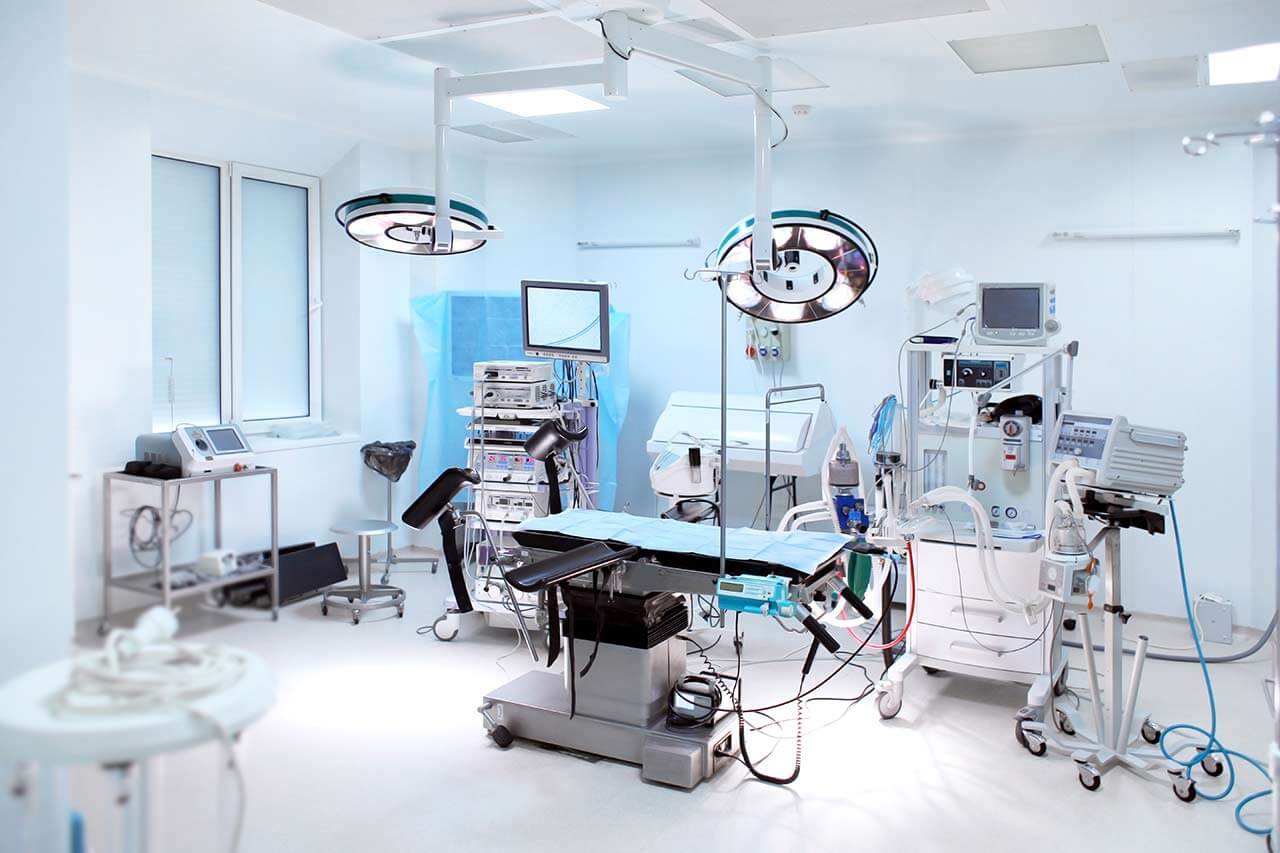
The program includes:
- Initial presentation in the clinic
- clinical history taking
- review of medical records
- physical examination
- laboratory tests:
- complete blood count
- general urine analysis
- biochemical analysis of blood
- TSH-basal, fT3, fT4
- tumor markers
- inflammation indicators (CRP, ESR)
- indicators of blood coagulation
- abdominal ultrasound scan
- CT scan/MRI or PET-CT of abdomen
- preoperative care
- cytoreductive surgery to remove visible tumors
inside the abdomen and HIPEC - histological and immunohistochemical
examination of removed tissues - symptomatic treatment
- cost of essential medicines
- nursing services
- stay in the hospital with a full board
- accommodation in a 2-bedroom ward
- elaboration of further recommendations
How program is carried out
During the first visit, the physician will conduct a clinical examination and go through the results of the available diagnostic tests. After that, you will undergo the necessary additional examination, such as the assessment of liver and kidney function, ultrasound scan and tomography of the abdominal organs. Based on the results of the examination, the physician will choose the surgical technique and the type of anesthesia. After that, preparation according to the preoperative standard will start.
Cytoreductive surgery begins with general anesthesia. The intervention is performed as open surgery, i.e. through the incision in the anterior abdominal wall, so that the surgeon can carefully examine the peritoneum and the surface of the abdominal organs. The surgeon removes affected by the malignant process areas of the colon and peritoneum, metastases in other internal organs. This stage of the operation can take several hours, since the overall effectiveness of the treatment depends on the completeness of the malignant tissues removal.
At the next stage of the operation, the surgeon inserts several catheters into the abdominal cavity. Through the catheters, a heated solution of a chemotherapy drug is pumped inside. The special system maintains the required temperature (42-43 degrees Celsius), pressure and circulation rate of the medicinal solution. The solution mechanically flushes out blood clots and remnants of malignant tissues, and a heated chemotherapy drug destroys micrometastases in internal organs and lymph nodes (micrometastases can’t be detected by the naked eye).
After 1-1.5 hours, the chemotherapy drug is removed from the abdominal cavity and the abdominal cavity is washed with saline. After that, the surgeon removes the catheters and sutures the incision of the anterior abdominal wall.
After the completion of the operation, you will be transferred to the ward of the intensive care unit, under the round-the-clock supervision of doctors and nurses. In 1-3 days after the operation, your drains will be removed and you will be transferred to a regular ward for further recovery. The whole treatment takes 10-12 days on average.
Finally, the attending physician will evaluate the results of control examinations, schedule the date of discharge from the hospital and give you detailed recommendations for further follow-up and treatment.
Required documents
- Medical records
- Esophagogastroduodenoscopy (EGD), MRI/CT scan (not older than 3 months)
- Biopsy results (if available)
Service
You may also book:
 BookingHealth Price from:
BookingHealth Price from:
About the department
The Department of General, Abdominal and Pediatric Surgery at the University Hospital Duesseldorf offers the full range of surgical treatment of diseases of the organs of abdominal cavity, thorax, emergency surgical care in polytrauma, as well as many surgical interventions in children. Of particular interest is cancer surgery on the liver, gallbladder, and pancreas. In addition, the department's specialists masterfully manage all the methods of bariatric surgery. Many operations are performed using minimally invasive techniques, which facilitate the quickest possible recovery of the patient. The department is headed by Prof. Dr. med. Wolfram Trudo Knoefel.
The service range of the department includes:
- Pediatric surgery
- Appendicitis
- Undescended testicles
- Acute pain in the testicles
- Phimosis
- Vesicoureteral reflux
- Pectus excavatum
- Tumor removal
- Correction of congenital malformations
- Thoracic surgery
- Lung cancer
- Lung metastases
- Defects and pathological changes of the thoracic wall
- Pathological changes of the pleura
- Pneumothorax
- Thymoma
- Hyperhidrosis (excessive sweating)
- Cancer surgery and surgical treatment of metastases
- Surgical treatment of obesity (bariatric surgery)
- Intragastric balloon implantation
- Gastric banding
- Sleeve gastroplasty
- Gastric bypass surgery
- Minimally invasive surgery
- Surgical treatment of diseases of the esophagus and stomach
- Zenker's diverticulum
- Reflux disease
- Achalasia cardia
- Esophageal, stomach cancer
- Benign stomach tumors
- Gastrointestinal stromal tumors
- Surgical treatment of coloproctological diseases
- Surgical treatment of pancreatic diseases
- Surgical treatment of hernias
- Surgical treatment of neuroendocrine tumors
- Hepatobiliary surgery (diseases of the liver and biliary tract)
- Surgical treatment of soft tissue sarcomas
- Other medical services
Curriculum vitae
Prof. Knoefel studied medicine at the University of Hamburg, the University of Lausanne, Harvard Medical School in Boston, and School of Medicine at Mount Sinai in New York. After the admission to medical practice, he worked in the Department of Surgery at the University Hospital of Ludwig Maximilian University of Munich, Massachusetts General Hospital, Harvard Medical School, as well as in the Department of Surgery at the University Hospital Hamburg-Eppendorf. In 1993, Prof. Knoefel was awarded the title of Medical Specialist. In 1996, he defended his doctoral thesis on the subject "Disorders of microcirculation in acute pancreatitis". In 2003, the doctor hold the position of the Head of the Department of General, Abdominal and Pediatric Surgery at the University Hospital Duesseldorf.
The main focuses of his clinical activities include the surgical treatment of malignant tumors of the liver, biliary tract, and pancreas, thyroid, lung, and rectum. The research activities focus on the study of metastatic tumor cells, systemic diseases in malignant tumors of the thorax and abdomen, regeneration of the liver, stem cells, ischemia, and perfusion of the liver, targeted therapy in neuroendocrine tumors, hepatocellular carcinomas, etc.
The professor is a member of numerous national and international professional societies, such as the Society of Digestive Surgery, American College of Surgeons, Transplantation Society, American Gastroenterological Association, Society of Pelvic Surgeons, American College of Surgeons, American Pancreatic Association, German Society for Thoracic Surgery, German Society of General and Abdominal Surgery, and German Society of Surgery.
Photo of the doctor: (c) Universitätsklinikum Düsseldorf
About hospital
According to the authoritative Focus magazine, the University Hospital Duesseldorf ranks among the top Germany hospitals!
The hospital is an excellent example of a combination of high-quality health care, research and teaching activities. With more than 50,000 inpatients and about 300,000 outpatients every year, the hospital is one of the largest and most prestigious medical institutions in Germany and Europe.
Modern, safe and sparing diagnostic and therapeutic methods guarantee effective treatment of various diseases and their consequences. All therapeutic processes are based on an interdisciplinary approach, which provides comprehensive medical care and optimal treatment result. Obviously, one of the key roles in the successful clinical practice of the medical institution is played by a highly qualified medical personnel, which consists of the best world-class doctors. The hospital also has a special advantage due to the structured equipment with the innovative medical technologies.
The hospital presents almost all fields of modern medicine. Special attention should be given to such focuses as oncology and hematology, stem cell transplantation, neurosurgery and neurology, urology, obstetrics and gynecology, hepatology, kidney transplantation, vascular surgery, cardiac surgery, pediatric surgery, pediatric oncology, etc.
In addition to the outstanding quality of medical services, the hospital guarantees each patient an attentive care, friendly atmosphere, as well as sensitive and respectful attitude.
Photo: (с) depositphotos
Accommodation in hospital
Patients rooms
The patients of the University Hospital Duesseldorf live in comfortable single, double and triple rooms. The patient rooms are made in bright colors and modern design. The room furnishing includes an automatically adjustable bed, a bedside table, a wardrobe, a telephone, a multimedia device (TV, radio, Internet access), a table and chairs for receiving visitors. To use the phone and multimedia device, the patient should have a special chip card, which can be purchased at the reception. In the pediatric departments multimedia device can be used for free.
Meals and Menus
The patients of the hospital are offered a varied, tasty and healthy diet. Every day there are three menus to choose from for adults and four menus to choose from for children, while it is possible to develop an individual menu. When pre-ordering, the international patients may have dishes of various cuisines of the world, for example, Asian and African cuisine. If a patient needs a diet in accordance with the clinical indications, he will be provided with a special diet menu, including drinks.
Every day, the nurses inform the kitchen workers about the patient wishes using an electronic data processing system. Immediately before serving food, there are printed special cards, which indicate for which patient this or that dish is intended.
Also, the hospital houses a cafeteria with a rich selection of delicious, healthy dishes, snacks and drinks.
Further details
Standard rooms include:
Religion
Christian priests are available for the patients at any time. Representatives of other religions may be requested at any time.
Accompanying person
Your companion may stay with you in your room or at a hotel of your choice during the fixed program.
Hotel
You may stay at the hotel during the outpatient program. Our employees will support you for selecting the best option.
The hospital offers a full range of laboratory tests (general, hormonal, tests for infections, antibodies, tumor markers, etc.), genetic tests, various modifications of ultrasound scans, CT scans, MRI and PET / CT, angiography, myelography, biopsy and other examinations. Treatment with medications, endoscopic and robotic operations, stereotaxic interventions is carried out here, modern types of radiation therapy are also used. The hospital offers patients all the necessary therapeutic techniques.
- Dermatosurgery
- Skull base surgery
- Gastric bypass and bandage
- Removal of lung metastases
- Interventions on the spine
These are skin cancer (including melanoma), head and neck tumors, pathological changes in the chest (including funnel chest), obesity, liver diseases, HIV and other infectious diseases, varicose veins, aortic aneurysm, carotid artery stenosis, joint diseases and other pathologies.
- Dermatology
- Oncology
- Otorhinolaryngology
- Endocrinology and diabetology
- Orthopedics and traumatology
Over 800 highly qualified physicians work at the hospital.






